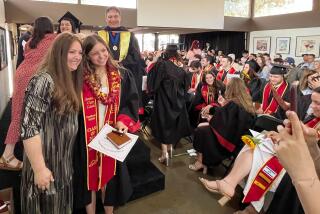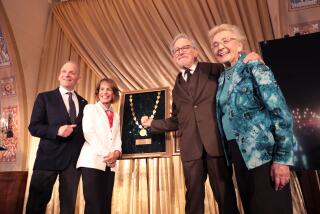Fifth of ‘USC Seven’ Gets OK to Leave the Soviet Union
- Share via
Refusenik geophysicist Semion Katz has been permitted to leave the Soviet Union, and within a month is expected to arrive in Los Angeles to begin a two-year visiting professorship at USC, university officials said Wednesday.
Katz, his wife, Vera, and his two children, Leona, 18, and Alexander, 22, arrived in Vienna on Monday, said Rabbi Laura Geller, director of USC’s Hillel Jewish Center.
He is the fifth of the “USC Seven” to leave the Soviet Union and take teaching posts at American universities. The group consists of seven distinguished Soviet Jewish scientists recruited by the university amid much publicity in 1983.
“We are absolutely delighted that he’s coming,” said William Spitzer, USC’s dean of letters, arts and sciences. “He is very distinguished in his field.”
Spitzer said Katz, whose specialty is seismology, has written several books and “a number of papers. He is obviously dedicated to his discipline.”
USC undertook the unusual recruiting program in 1982, after several Jewish faculty members learned that the Soviet government had begun revoking the doctoral degrees of academics who had applied to emigrate, Geller said.
Working with the Los Angeles Federation Council’s Commission on Soviet Jewry, Geller and USC faculty members identified seven refusenik scientists and persuaded USC departments to offer them visiting professorships.
USC staff members personally delivered the invitations on a trip to the Soviet Union in 1983, Geller said, and the refusenik professors “were incredibly moved that the university would do this.”
Of the five professors who have been allowed to leave the Soviet Union, one is at Princeton, two are teaching at Ohio State, and mathematician Victor Kipnis, Katz’s friend, has been at USC since last year.
“When USC originally made its offer, Katz was regarded as one of the more prominent people in the group,” Spitzer said. “He’s really a first-class individual in his field. We were hopeful some (of the seven) would come when we made the offer, but realistically it didn’t look too good. We’re very happy to have him.”
Geller said she spoke to Vera Katz earlier this summer by telephone to report that USC students, faculty and friends had written hundreds of letters to Soviet officials requesting that the Katz family be allowed to leave.
“She told me that they had been called to the emigration office and promised that they would be free to go immediately if they agreed to cancel a conference scheduled to take place in their apartment to coincide with an International Women’s Conference in Moscow,” Geller said.
“The Katz family refused to cancel the conference. Over a hundred women crowded into the small Moscow apartment to hear reports about women in the refusenik movement, separated families and problems associated with wives and mothers of political prisoners.”
The conference was reported in newspapers, Geller said, and the Katz family received scores of anti-Semitic calls the next day.
“When I spoke to Vera, the chances of receiving permission to leave looked bleak,” Geller said. “But miracles do happen. All the pressure, energy and maybe even the prayers made a difference.”
More to Read
Sign up for Essential California
The most important California stories and recommendations in your inbox every morning.
You may occasionally receive promotional content from the Los Angeles Times.










